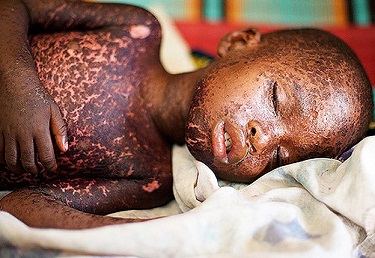Measles Crisis In Adamawa-Nigeria Escalating! 49 Deaths, 143 Cases. New Strains Possibly Involved!
Nikhil Prasad Fact checked by:Thailand Medical News May 09, 2024 11 months, 2 weeks, 3 days, 11 hours, 22 minutes ago
Measles News: Thailand Medical News has covered a report about the measles outbreak in the Northeastern state of Nigeria called Adamawa on the 29th fo April 2024.
https://www.thailandmedical.news/news/measles-complications-kills-19-children-in-measles-outbreak-in-adamawa-nigeria
 New Measles Strains Possibly Involved in Outbreak in Adamawa-Nigeria
New Measles Strains Possibly Involved in Outbreak in Adamawa-Nigeria
Since then, the situation seems to have escalated with new updates indicating that a total of 49 people have died from measles, 143 cases have been validated as having measles via proper diagnostics and another 818 individuals are being investigated and are undergoing health screenings due to being suspected of having been infected with measles as well.
The affected population comprises predominantly unvaccinated children, highlighting gaps in vaccination coverage. To address the outbreak, the state has deployed surveillance teams to track and contain the spread of the virus. Additionally, the government has initiated a vaccination campaign targeting vulnerable groups within the affected communities.
Possibly Of New Measles Strain At Play
Many local physicians are raising concerns that a possible new Measles strain could be at play as the have never seen measles outbreaks with many manifesting disease severity and also measles complications such as brain swellings, blindness etc.
The idea of the emergence of a new measles strain is not outrageous or not possible as already Italian researchers have identified a novel measles strain that debuted in Italy and parts of Europe in early 2024 and seems to be also driving disease severity!
https://www.thailandmedical.news/news/breaking-new-measles-d8-variant-in-italy-that-evades-current-test-spreading-silently-in-italy-with-over-231-cases-in-the-first-three-months-of-2024
Urgent genomic sequencings and studies are needed on the measles strains that are currently in circulation in Nigeria.
Local Government Efforts and Challenges
Health Commissioner Felix Tangwami outlined the government's response to the outbreak, emphasizing the distribution of measles vaccines to affected areas and the deployment of field teams to manage the situation. However, challenges such as widespread insecurity and disruptions in vaccination campaigns pose significant hurdles to effectively combating the outbreak. Tangwami's statement to various local
Measles News outlets and media underscores the complex interplay between public health initiatives and broader socio-political factors that impact healthcare delivery in regions like Adamawa.
Measles: A Persistent Global Healt
h Challenge
Measles remains a significant global health concern, particularly in regions with limited healthcare infrastructure and access to vaccines. The highly contagious nature of the virus, coupled with gaps in immunization coverage, contributes to recurring outbreaks and preventable deaths, especially among young children. The World Health Organization's data highlights the progress made in measles prevention through vaccination campaigns but also underscores the persistent challenges in achieving optimal vaccination rates, exacerbated by factors such as conflicts and pandemics.
Impact of COVID-19 on Measles Prevention
The COVID-19 pandemic has further strained healthcare systems and disrupted routine immunization programs, amplifying the vulnerability of populations to measles outbreaks. Organizations like Doctors Without Borders (MSF) have noted the repercussions of pandemic-related disruptions on vaccination efforts, leading to an uptick in measles cases in certain regions. The inability to reach the recommended vaccination rate due to logistical challenges and access issues has contributed to the resurgence of measles in areas with pre-existing healthcare challenges.
Lessons Learned and Strategies Moving Forward
The measles crisis in Adamawa underscores the need for multifaceted approaches to strengthen immunization programs and enhance outbreak response capabilities. Collaborative efforts between governments, healthcare providers, NGOs, and the media are essential in promoting vaccination uptake, disseminating accurate information, and addressing systemic barriers to healthcare access. Investment in resilient healthcare systems, community engagement, and continuous monitoring of vaccination coverage are crucial components of sustainable measles prevention strategies.
Conclusion: Towards a Resilient Public Health Infrastructure
As the measles crisis unfolds in Adamawa, it serves as a poignant reminder of the ongoing challenges faced by communities and healthcare systems in combating infectious diseases. The convergence of factors such as inadequate vaccination coverage, socio-political instability, and disruptions from pandemics underscores the imperative for proactive measures and coordinated responses. By prioritizing vaccination equity, strengthening healthcare infrastructure, and fostering partnerships across sectors, we can strive towards a more resilient and inclusive public health infrastructure that safeguards communities against preventable outbreaks like measles.
For the latest
Measles News, keep on logging to Thailand Medical News.
